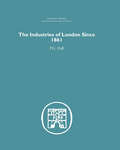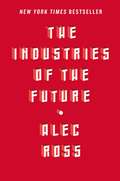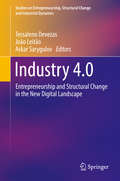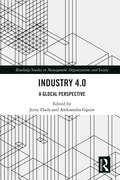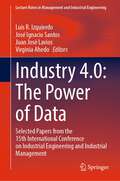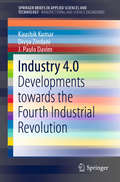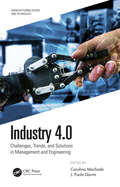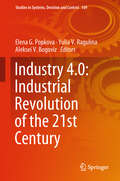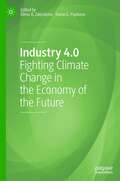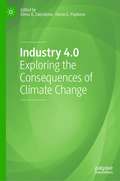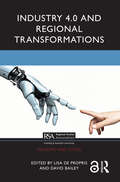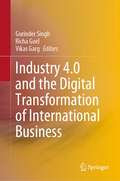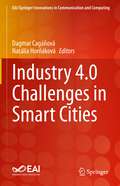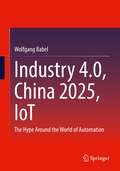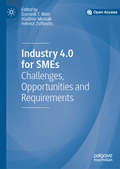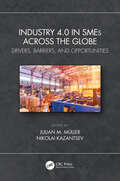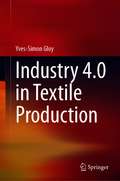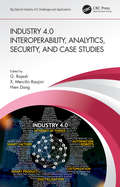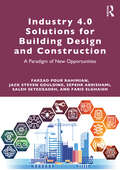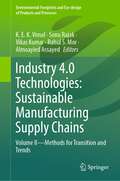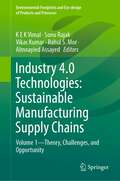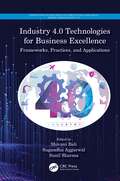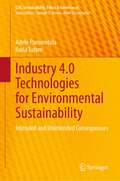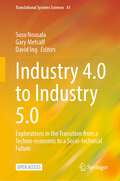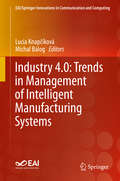- Table View
- List View
Industries of London Since 1861
by P.G. HallFirst Published in 2005. Routledge is an imprint of Taylor & Francis, an informa company.
The Industries of the Future
by Alec RossLeading innovation expert Alec Ross explains what's next for the world: the advances and stumbling blocks that will emerge in the next ten years, and how we can navigate them.While Alec Ross was working as Senior Advisor for Innovation to the Secretary of State, he traveled to forty-one countries, exploring the latest advances coming out of every continent. From startup hubs in Kenya to R&D labs in South Korea, Ross has seen what the future holds. In The Industries of the Future, Ross shows us what changes are coming in the next ten years, highlighting the best opportunities for progress and explaining why countries thrive or sputter. He examines the specific fields that will most shape our economic future, including robotics, cybersecurity, the commercialization of genomics, the next step for big data, and the coming impact of digital technology on money and markets. In each of these realms, Ross addresses the toughest questions: How will we adapt to the changing nature of work? Is the prospect of cyberwar sparking the next arms race? How can the world's rising nations hope to match Silicon Valley in creating their own innovation hotspots? And what can today's parents do to prepare their children for tomorrow? Ross blends storytelling and economic analysis to give a vivid and informed perspective on how sweeping global trends are affecting the ways we live. Incorporating the insights of leaders ranging from tech moguls to defense experts, The Industries of the Future takes the intimidating, complex topics that many of us know to be important and boils them down into clear, plainspoken language. This is an essential book for understanding how the world works--now and tomorrow--and a must-read for businesspeople in every sector, from every country.
Industry 4.0
by Tessaleno Devezas João Leitão Askar SarygulovThis book presents the latest research perspectives on how the Industry 4. 0 paradigm is challenging the process of technological and structural change and how the diversification of the economy affects structural transformation. It also explores the impact of fast-growing technologies on the transformation of socioeconomic and environmental systems, and asks whether structural and technological change can generate sustainable economic growth and employment. Further, the book presents the basic innovations (new technologies, materials, energy, etc) and industrial policies that can lead to such a structural change.
Industry 4.0: A Glocal Perspective (Routledge Studies in Management, Organizations and Society)
by Jerzy Duda Aleksandra GąsiorThe Fourth Industrial Revolution, also known as Industry 4.0, refers to the industrial paradigm bringing together the digital and physical worlds through the cyber-physical Systems, enhanced by the Internet of Things aimed to increase the effectiveness of human-machine cooperation (HMC). This book deals with issues related to the challenges of Industry 4.0 that are faced by enterprises and universities. Contrary to most publications on the subject, it covers both technological and business aspects of these challenges and shows how strong they are intertwined, bringing new value to readers. The book also presents new findings that will guide enterprises through Industry 4.0. This book offers readers an in-depth discussion of important areas of enterprises’ activities in the context of Industry 4.0. The first area concerns human resources management; in particular, what new employee competencies will be needed on the labor market, how to use modern concepts (e.g. design thinking), and how to manage multi-national teams of employees. The second area is related to marketing and covers issues regarding customized products. The third area is devoted to technical aspects such as autonomous vehicles, Internet of Things (IoT), radio-frequency identification (RFID) systems, and Bluetooth Low Energy (BLE) technology. The fourth area concerns IT systems, including systems that support work and business management, strategic information systems, and cyber-physical systems. Aimed at researchers, academics, practitioners, and students, it will be of value to those in the fields of human resource management, marketing, organizational studies, and management of technology and innovation.
Industry 4.0: Selected Papers from the 15th International Conference on Industrial Engineering and Industrial Management (Lecture Notes in Management and Industrial Engineering)
by Luis R. Izquierdo José Ignacio Santos Juan José Lavios Virginia AhedoThis book is a compilation of some of the best papers presented at the 15th International Conference on Industrial Engineering and Industrial Management in 2021. The Conference was promoted by ADINGOR (Asociación para el Desarrollo de la Ingeniería de Organización), organized by the University of Burgos, and it took place online on July 8 and 9, 2021.The book highlights some of the latest research advances and cutting-edge analyses of real-world case studies on industrial engineering and industrial management from a wide range of international contexts. It also identifies business applications and the latest findings and innovations in operations management and decision sciences.Industry 4.0: The Power of Data will help academic researchers and practitioners in industrial engineering and industrial management to keep abreast of state-of-the-art developments in these subjects.
Industry 4.0: Developments towards the Fourth Industrial Revolution (SpringerBriefs in Applied Sciences and Technology)
by Kaushik Kumar Divya Zindani J. Paulo DavimThis book provides an overview of the burgeoning next generation of industry- Industry 4.0, which promises to increase flexibility in manufacturing in tandem with mass communication, improved productivity and better quality. This volume provides a comprehensive and holistic overview of intelligent manufacturing, process planning, assessment of product development opportunities, aspects of risk management, education and qualification requirements, socio-technical considerations and the sustainability of business models. This volume will be of interest to engineers, entrepreneurs, academics and students working in these fields.
Industry 4.0: Challenges, Trends, and Solutions in Management and Engineering (Manufacturing Design and Technology)
by Carolina Machado J. Paulo DavimIndustry 4.0 is a challenge for today’s businesses. It’s a concept that encompasses the technological innovations of automation, control, and information technology, as it’s applied to manufacturing processes. It’s a new topic that recently emerged in academia and industry, with few books that target both management and engineering. This book will cover the new advances and the way to manage competitive organizations. The chapters will include terms of theory, evidence, and/or methodology, and significantly advance social scientific research. This book: Focuses on the latest and most recent research findings occurring on the topic of Industry 4.0 Presents the ways companies around the world are facing today's technological challenges Assists researchers and practitioners in selecting the correct options and strategies to manage competitive organizations Provides recent advances in international studies Encompasses the main technological innovations in the fields of automation, control, and information technology applied to the manufacturing processes Industry 4.0: Challenges, Trends, and Solutions in Manangment and Engineering is designed to increase the knowledge and effectiveness of all managers and engineers in all organizations and activity sectors Carolina Machado has been teaching in the Human Resources Management subjects since 1989 at University of Minho, Portugal. She has been an associate professor since 2004, with experience and research interest areas in the field of Human Resource Management, International Human Resource Management, Human Resource Management in SMEs, Training and Development, Emotional Intelligence, Management Change, Knowledge Management, and Management/HRM in the Digital Age. She is head of the Department of Management and head of the Human Resources Management Work Group at University of Minho, as well as chief editor of the International Journal of Applied Management Sciences and Engineering (IJAMSE). J. Paulo Davim is a professor at the Department of Mechanical Engineering of the University of Aveiro, Portugal. He has more than 30 years of teaching and research experience in Manufacturing, Materials, Mechanical, and Industrial Engineering, with special emphasis in Machining & Tribology. He has also interest in Management, Engineering Education, and Higher Education for Sustainability. He has worked as evaluator of projects for ERC (European Research Council) and other international research agencies.
Industry 4.0: Industrial Revolution of the 21st Century (Studies in Systems, Decision and Control #169)
by Elena G. Popkova Yulia V. Ragulina Aleksei V. BogovizThis book addresses a wide range of issues relating to the theoretical substantiation of the necessity of Industry 4.0, the development of the methodological tools for its analysis and evaluation, and practical solutions for effectively managing this process. It particularly focuses on solving the problem of optimizing the development of Industry 4.0 in the context of knowledge economy formation. The book presents the authors’ approach to studying the process of Industry 4.0 formation in connection with knowledge economy, and approach that allows the process to be studied in connection with the existing socio-economic and technological conditions. As a result, the conclusions and recommendations could be applied to modern economic systems and do not require any further elaboration. The presented research is based on modern economic theory scientific and methodological tools, including the tools of the theory of economic cycles, the theory of games, and the institutional economic theory. Raising awareness of the problem of Industry 4.0 formation, the book is of interest to a wide audience, including not only specialists and experts with a detailed knowledge of the topic, but also scholars, lecturers, and undergraduates of various fields of economics.
Industry 4.0: Fighting Climate Change in the Economy of the Future
by Elena G. Popkova Elena B. ZavyalovaThis book presents a scientific view of fighting climate change in the economy of the future, the foundations of which are being set around the world. The authors substantiate the potential of Industry 4.0 in stimulating sustainable development in environmental protection and preservation of natural resources. This book considers the modern experience of fighting climate change based on possibilities of Industry 4.0 at the national scale in view of developed and developing countries with a special focus on Russia and at the corporate scale by the example of transnational corporations. It determines the future contribution of Industry 4.0 into development of responsible production and consumption, and compiles the “outlines” of “green” economy in Industry 4.0. It offers recommendations for control of climate change in Industry 4.0, and presents the authors’ vision of ecological responsibility in Industry 4.0 for implementing the sustainable development goals. This book will be of interest to academics and practitioners interested in climate change and development of Industry 4.0, as well contributing to a national economic policy for fighting climate change and corporate strategies of sustainable development in Industry 4.0.
Industry 4.0: Exploring the Consequences of Climate Change
by Elena B. Zavyalova Elena G. PopkovaThis book reflects the futuristic scientific view of the consequences of transition to Industry 4.0 for climate change. The authors present a systemic overview of the current negative consequences of digitization for the environment, new outlines of the energy sphere in Industry 4.0 and the change of the environment pollution level in Industry 4.0. The book also analyses the ecological consequences of growth and development of Industry 4.0, and considers Industry 4.0 as an alternative to fighting climate change. The book presents a view on fighting climate change in Industry 4.0 from the positions of shifting the global community’s attention from environment protection to formation of the digital economy. A logical continuation of this book is a view from the opposite side, which would allow reflecting the contribution of Industry 4.0 into fighting climate change and the perspectives of harmonization of these top-priority directions of the global economy’s development. This book will be of interest to academics and practitioners interested in climate change and development of Industry 4.0, as well contributing to a national economic policy for fighting climate change and corporate strategies of sustainable development in Industry 4.0.
Industry 4.0 and Regional Transformations (Regions and Cities)
by Lisa De Propris David BaileyThis edited volume brings together a group of expert contributors to explorebthe opportunities and the challenges that Industry 4.0 (smart manufacturing) is likely to pose for regions, fi rms and jobs in Europe. Drawing on theory and empirical cases, it considers emerging issues like servitization, new innovation models for local production systems and the increase in reshoring. Industry 4.0 and Regional Transformations captures the complexity of this new manufacturing model in an accessible way and considers its implications for the future. It will be essential reading for advanced students and researchers and policy makers in regional studies, industrial policy, economic geography, innovation studies, operations management and engineering.
Industry 4.0 and the Digital Transformation of International Business
by Gurinder Singh Richa Goel Vikas GargThe book throws light on the ongoing trends in international business, integration of information technology with global businesses, its role in value co-creation, resource integration, and service for service exchange. While discussing the issues of these areas, chapters of this book also delve into prevalent problematic areas which are closely related like employment, ethical aspects, power creation, and so on. Recognizing the role digitization and new technologies play in enabling global managers to communicate with outside world directly via digital channels irrespective of their location (which is especially true in time of COVID-19), the book takes an emerging economy perspective and throws light on new theories, perceptions, employment opportunities, and innovative ideas through its content. The book not only discusses effects of information technology but also the latest emerging technology in global business like use of artificial intelligence, robotics, machine learning, big data, and their integration with the global business 4.0. Since emergence of these new technologies requires proper infrastructural development, the book also throws light on government initiatives and CSR in this respect. It contains takeaways for both undergraduate and graduate students, researchers and academicians, industry watchers, practitioners, start-ups, and entrepreneurs
Industry 4.0 Challenges in Smart Cities (EAI/Springer Innovations in Communication and Computing)
by Dagmar Cagáňová Natália HorňákováThis book discusses the next level of innovative technologies influencing sectors in industry and their future in industrial, urban and sustainable development. The authors provide a platform for a discussion of a synergy of ideas within smart industrial innovations, approaching them from various points of view. These include industry and management 4.0, the expansion of new business models, smart technologies identifying global challenges, and other new trends and opportunities. New managerial ideas, innovations, and technologies for advances in mobility are highlighted together from a multidisciplinary perspective. This book is relevant to researchers, graduate students and those who are interested in Smart Cities.Discusses unique angles in the fields of Industrial ManagementLinks various global challenges in Industry 4.0, IoT, and Smart City applications by analysing results in practice
Industry 4.0, China 2025, IoT: The Hype Around the World of Automation
by Wolfgang BabelThe book gives an overview about automation technology over the last 50 years, based on my own experiences. It is a good summery for automation since 1970 for all who want to know about the context of automation developments and their standards. It is a fundamental summery and enables the reader to get experience in the complex field of automation.In detail the question is arised, whether Industry 4.0, China 2025, IoT, AI are a revolution or more an evolution of timewise established availbale technologies in HW, SW and algorithms. Is the hype about Industry 4.0 justified or not?In that context a timelline since 1970 ist shown for AI, ANN, essential milestones in automation, e.g OSI-model, automation pyramid, standards for bus systems, main SW-languages, robots, AI, ANN, pattern recognittion, Ethernet, the 12 most important international field busses, their main features and characterisitcs, foundation of committees, harmonization and standardization efforts, OPC UA and cloud computing, field devices, PLCs, SCADA, MES, ERP and automation history. All that history is seen in the context of µ-controller, DSP (Digital signal processor), FPGAs (Field Programmable Gate Arrays), ASICs (Application-Specific Integrated Circuit) , Chip on Board. It is include the HW-history, from Intel 8080 to octuple multicore processors. In the same way it is shown the history of field device out from laboratory into the field with all difficulties and benefits of that transition. The issues are summerized in a pyramid of complexity. Requirements for robustness and safety are shown for field devices. In the same way it is shown the development of mainframes, workstations and PC’s. SAP a leading ERP System is explained in mor detail. Specially it is figured out how SAP works and what has to be considered in working with such kind of system. The differences between MES- and ERP-systems are discussed, specially also for future combined SAP/MES systems. Explained are the problems of middlesized companies (SMEs) in dealing with Industry 4.0 and automation. Further examples are given and discussed for automized quality control in automotvie, PCB-handling, CIGS (Solar cell)-production. Also shown is the upgrade for older products and make them ready for automation standards. In detail the history oft he modern robotics is shown for the automotive industry. In summery also is figured out the Industry 5.0 which is just coming up more and more.
Industry 4.0 for SMEs: Challenges, Opportunities and Requirements
by Dominik T. Matt Vladimír Modrák Helmut ZsifkovitsThis open access book explores the concept of Industry 4.0, which presents a considerable challenge for the production and service sectors. While digitization initiatives are usually integrated into the central corporate strategy of larger companies, smaller firms often have problems putting Industry 4.0 paradigms into practice. Small and medium-sized enterprises (SMEs) possess neither the human nor financial resources to systematically investigate the potential and risks of introducing Industry 4.0. Addressing this obstacle, the international team of authors focuses on the development of smart manufacturing concepts, logistics solutions and managerial models specifically for SMEs. Aiming to provide methodological frameworks and pilot solutions for SMEs during their digital transformation, this innovative and timely book will be of great use to scholars researching technology management, digitization and small business, as well as practitioners within manufacturing companies.
Industry 4.0 in SMEs Across the Globe: Drivers, Barriers, and Opportunities
by Julian M. Müller Nikolai KazantsevThe field of small and medium-sized enterprises (SMEs) digitalization is becoming more mature and stands to significantly contribute to the full development of the agenda of Industry 4.0. Although national digitalization programs have their own goals, the common focus is on the role of SMEs in global value chains. Since SMEs are known to have challenges around Industry 4.0 implementation, this book integrates experience from 14 countries worldwide. Industry 4.0 in SMEs across the Globe: Drivers, Barriers, and Opportunities provides an in-depth overview of Industry 4.0 in SMEs, covering various national, historical, and geographical settings in nine European countries: Finland, France, Hungary, Italy, Poland, Russia, Lithuania, Serbia, and the UK, complemented by five other countries from around the world: Brazil, China, India, Iran, and the U.S. Each chapter describes the national digitalization program, along with barriers, drivers, and opportunities to implement Industry 4.0 in local SMEs. It subsumes the findings across these countries to identify common themes and clusters of drivers, barriers, and opportunities. The book concludes that there are common approaches of SMEs across the world to adopt Industry 4.0, which are to be understood to increase industrial competitiveness globally. This book is a great resource for digitalization leaders and laggards, business consultants and researchers, as well as Ph.D. and master’s students from industrial engineering and manufacturing backgrounds. Policy makers can also use the contents to better understand the commonalities and differences of national digitalization programs and further support SMEs in their digitalization process.
Industry 4.0 in Textile Production
by Yves-Simon GloyThis book discusses the design of textile production within the framework Industry 4.0. Relevant research topics in the textile industry are identified and solutions are conceptualized, developed and implemented. This is followed by an evaluation of the solutions in which, among other things, the profitability is considered. Questions about the transfer of knowledge into the company complete the work. Industry 4.0 in Textile Production provides a rich investigation into and survey of textile production The informative cases studies, clear perspective, and detailed analysis make this book of great use to engineers, researchers and postgraduate students interested in the textile industry.
Industry 4.0 Interoperability, Analytics, Security, and Case Studies (Big Data for Industry 4.0)
by G. Rajesh, X. Mercilin Raajini, and Hien DangAll over the world, vast research is in progress on the domain of Industry 4.0 and related techniques. Industry 4.0 is expected to have a very high impact on labor markets, global value chains, education, health, environment, and many social economic aspects. Industry 4.0 Interoperability, Analytics, Security, and Case Studies provides a deeper understanding of the drivers and enablers of Industry 4.0. It includes real case studies of various applications related to different fields, such as cyber physical systems (CPS), Internet of Things (IoT), cloud computing, machine learning, virtualization, decentralization, blockchain, fog computing, and many other related areas. Also discussed are interoperability, design, and implementation challenges. Researchers, academicians, and those working in industry around the globe will find this book of interest. FEATURES Provides an understanding of the drivers and enablers of Industry 4.0 Includes real case studies of various applications for different fields Discusses technologies such as cyber physical systems (CPS), Internet of Things (IoT), cloud computing, machine learning, virtualization, decentralization, blockchain, fog computing, and many other related areas Covers design, implementation challenges, and interoperability Offers detailed knowledge on Industry 4.0 and its underlying technologies, research challenges, solutions, and case studies
Industry 4.0 Solutions for Building Design and Construction: A Paradigm of New Opportunities
by Farzad Pour Rahimian Jack Steven Goulding Sepehr Abrishami Saleh Seyedzadeh Faris ElghaishThis book provides in-depth results and case studies in innovation from actual work undertaken in collaboration with industry partners in Architecture, Engineering, and Construction (AEC). Scientific advances and innovative technologies in the sector are key to shaping the changes emerging as a result of Industry 4.0. Mainstream Building Information Management (BIM) is seen as a vehicle for addressing issues such as industry fragmentation, value-driven solutions, decision-making, client engagement, and design/process flow; however, advanced simulation, computer vision, Internet of Things (IoT), blockchain, machine learning, deep learning, and linked data all provide immense opportunities for dealing with these challenges and can provide evidenced-based innovative solutions not seen before. These technologies are perceived as the “true” enablers of future practice, but only recently has the AEC sector recognised terms such as “golden key” and “golden thread” as part of BIM processes and workflows. This book builds on the success of a number of initiatives and projects by the authors, which include seminal findings from the literature, research and development, and practice-based solutions produced for industry. It presents these findings through real projects and case studies developed by the authors and reports on how these technologies made a real-world impact. The chapters and cases in the book are developed around these overarching themes: • BIM and AEC Design and Optimisation: Application of Artificial Intelligence in Design • BIM and XR as Advanced Visualisation and Simulation Tools • Design Informatics and Advancements in BIM Authoring • Green Building Assessment: Emerging Design Support Tools • Computer Vision and Image Processing for Expediting Project Management and Operations • Blockchain, Big Data, and IoT for Facilitated Project Management • BIM Strategies and Leveraged Solutions This book is a timely and relevant synthesis of a number of cogent subjects underpinning the paradigm shift needed for the AEC industry and is essential reading for all involved in the sector. It is particularly suited for use in Masters-level programs in Architecture, Engineering, and Construction.
Industry 4.0 Technologies: Volume II - Methods for transition and trends (Environmental Footprints and Eco-design of Products and Processes)
by K. E. K. Vimal Sonu Rajak Vikas Kumar Rahul S. Mor Almoayied AssayedThis book covers topics related to implementation of advanced technologies, such as AI, big data, procurement 4.0, Logistics 4.0 and Lean 4.0, in Industry 4.0 for the manufacturing supply chain. Many applications of Industry 4.0 in the manufacturing supply chain have been presented. The content of this book is useful for students, researchers and professionals in order to implement Industry 4.0 in manufacturing supply chain.
Industry 4.0 Technologies: Volume 1—Theory, Challenges, and Opportunity (Environmental Footprints and Eco-design of Products and Processes)
by K E K Vimal Sonu Rajak Vikas Kumar Rahul S. Mor Almoayied AssayedThis book brings forth the fundamental understanding of the role of Industry 4.0 technologies in sustainable manufacturing supply chain. Readers will get an overview of the challenges, opportunities, and requirements for the implementation of digital technologies and how they can support manufacturing supply chains to be sustainable. The book presents many applications of Industry 4.0 including integration of IoT, AI, Big Data, Blockchain, Procurement 4.0, Logistics 4.0, and Lean 4.0 in different contexts. The book therefore provides a platform for researchers, academicians, and professionals from diverse backgrounds to gain state-of-the-art knowledge for using Industry 4.0 in sustainable manufacturing supply chains. Readers will also be able to identify the practical significance and opportunities for future work directions.
Industry 4.0 Technologies for Business Excellence: Frameworks, Practices, and Applications (Demystifying Technologies for Computational Excellence)
by Shivani BaliThis book captures deploying Industry 4.0 technologies for business excellence and moving towards Society 5.0. It addresses applications of Industry 4.0 in the areas of marketing, operations, supply chain, finance, and HR to achieve business excellence. Industry 4.0 Technologies for Business Excellence: Frameworks, Practices, and Applications focuses on the use of AI in management across different sectors. It explores the benefits through a human-centered approach to resolving social problems by integrating cyberspace and physical space. It discusses the framework for moving towards Society 5.0 and keeping a balance between economic and social gains. This book brings together researchers, developers, practitioners, and users interested in exploring new ideas, techniques, and tools and exchanging their experiences to provide the most recent information on Industry 4.0 applications in the field of business excellence. Graduate or postgraduate students, professionals, and researchers in the fields of operations management, manufacturing, healthcare, supply chain, marketing, finance, and HR will find this book full of new ideas, techniques, and tools related to Industry 4.0.
Industry 4.0 Technologies for Environmental Sustainability: Intended and Unintended Consequences (CSR, Sustainability, Ethics & Governance)
by Adele Parmentola Ilaria TutoreIndustry 4.0 technologies are expected to have a positive impact on the global economy by promoting autonomous interoperability, agility, flexibility, decision-making, efficiency or cost reduction, which are also expected to be resource efficient. However, new and emerging technologies can also have potentially harmful social and environmental impacts that must be considered.The goal of this book is to provide a deeper understanding of how Industry 4.0 technologies can benefit or harm the environmental sustainability of companies. To this end, it presents a classification of Industry 4.0 technologies and evaluates for each typology the positive and negative aspects of their implementation. Thus, the book considers Industry 4.0 technology and environmental sustainability from the perspective of management on the one hand and from the perspective of technology users on the other. The book is of interest to researchers from various disciplines who approach Industry 4.0 technologies from a business perspective, and on the other hand to managers and strategic consultants who want to promote sustainable change in their companies.
Industry 4.0 to Industry 5.0: Explorations in the Transition from a Techno-economic to a Socio-technical Future (Translational Systems Sciences #41)
by Susu Nousala Gary Metcalf David IngThis is an Open Access book.In 2015, Industry 4.0 was announced with the rise of industrialization by the European Parliament, supporting policy, research, and infrastructure funding. In 2020, Industry 5.0 was launched as an evolution of Industry 4.0, towards societal and ecological values in a sustainable, human-centric, and resilient transition. In 2023, the IN4ACT research project team completed 4 years of research on the impact on these initiatives.Presentations reviewing the progress of management practices and economics led to conversations about what’s next. The unanticipated rise in late 2022 of Generative AI technologies (e.g. ChatGPT, DALL-E) sparked dialogues with an extended circle of researchers on impacts not considered in 2015 or in 2020. This collection of chapters reflects multiple perspectives on research findings to 2023, prospects for 2024, and considerations on ways the techno-economic industrial revolutions may be reshaped into desirable futures respecting social and ecological concerns.
Industry 4.0: Trends in Management of Intelligent Manufacturing Systems (EAI/Springer Innovations in Communication and Computing)
by Michal Balog Lucia KnapčíkováThis book provides a comprehensive exchange of information on current developments in the management of manufacturing systems and Industry 4.0. The book’s contributions establish channels of communication and disseminate knowledge among professionals working in manufacturing and related institutions. It features submissions from experts, researchers, academicians and practitioners in relevant fields, who share their knowledge from the field of management of manufacturing systems. The book’s main theme is Management of Manufacturing Systems with support for Industry 4.0, Logistics and Intelligent Manufacturing Systems and Applications, Cooperation management and its effective applications. Topics include Logistics, RFID Applications, Industrial and Smart Logistics, Intelligent Manufacturing Systems and Applications, New Materials and Smart Technologies for Industry 4.0, Enterprise Information Systems, Innovation and Knowledge Management, and Sequencing solutions for Lean Manufacturing.
